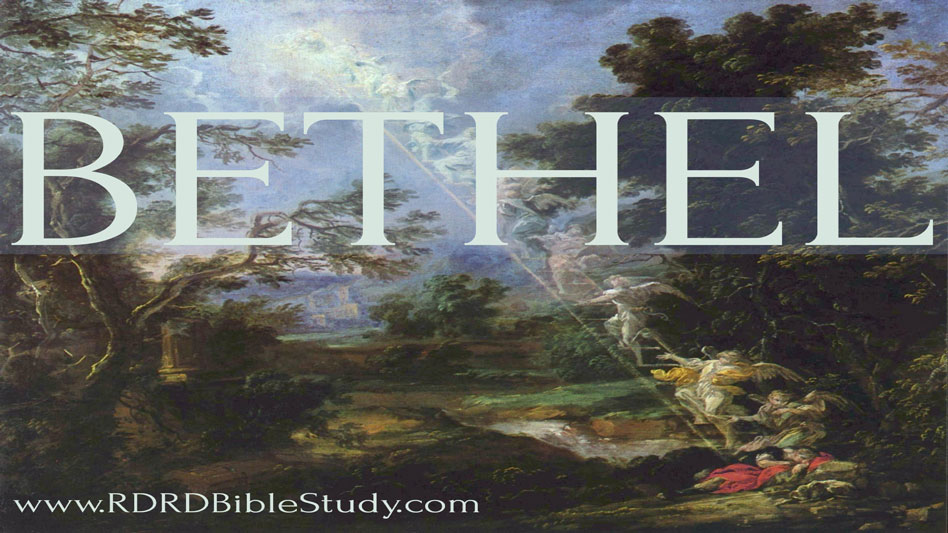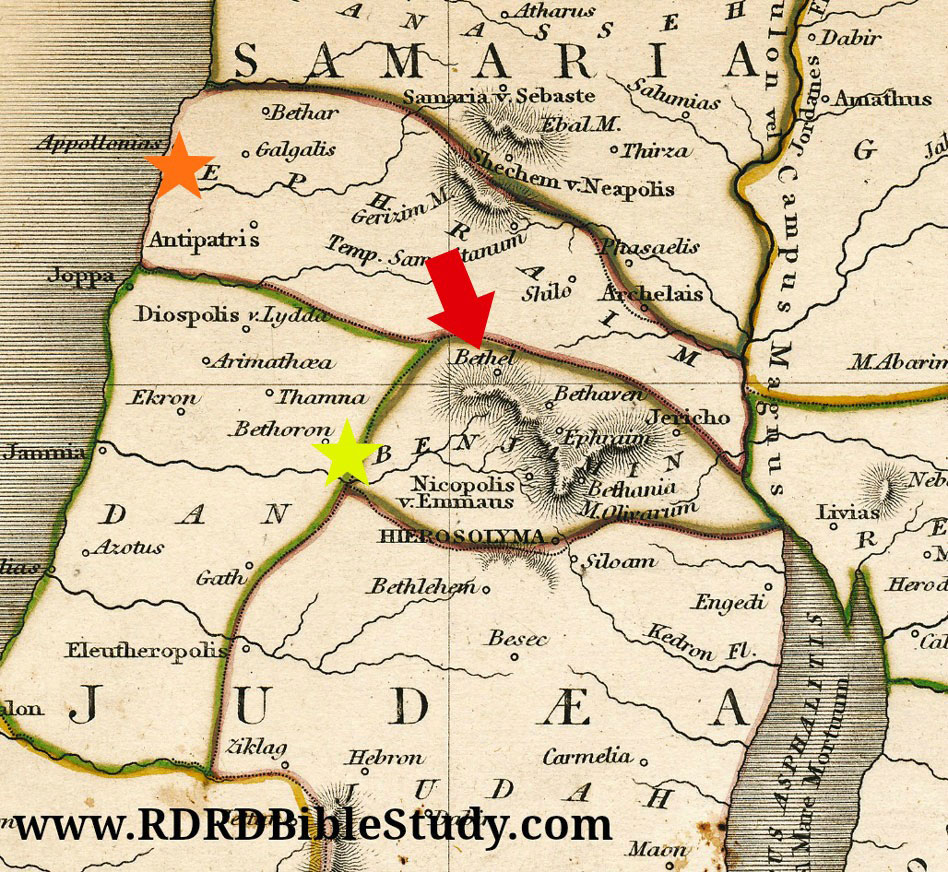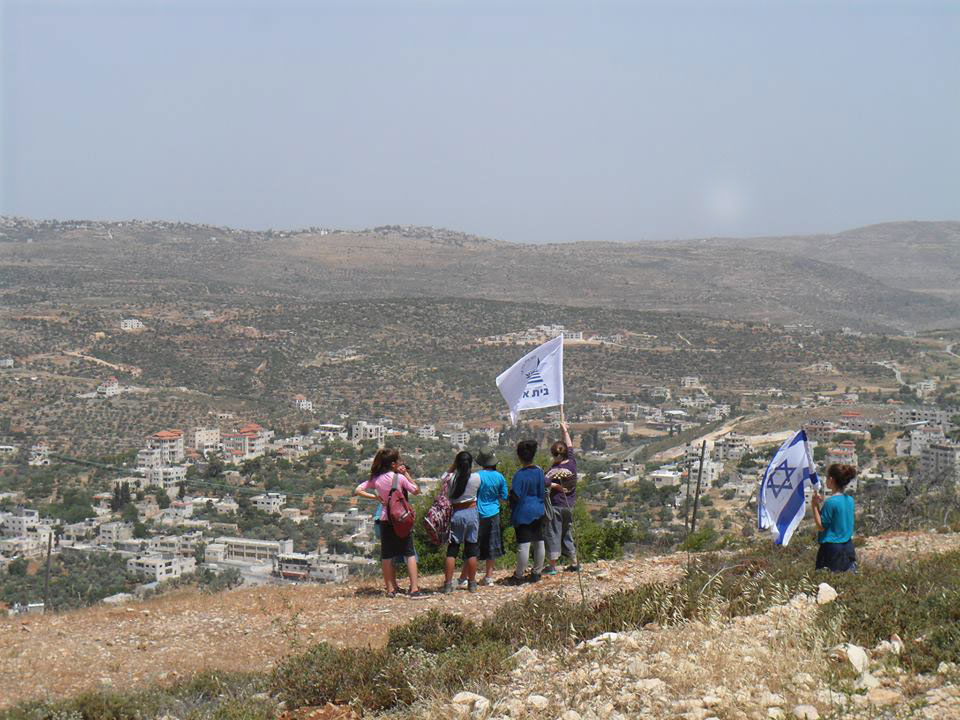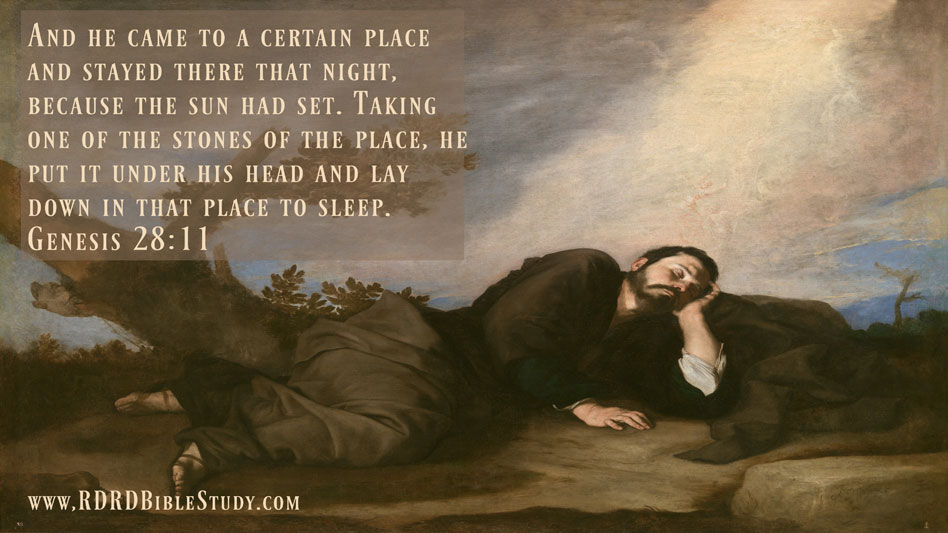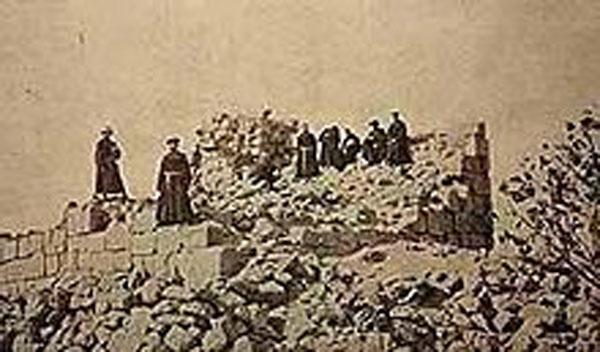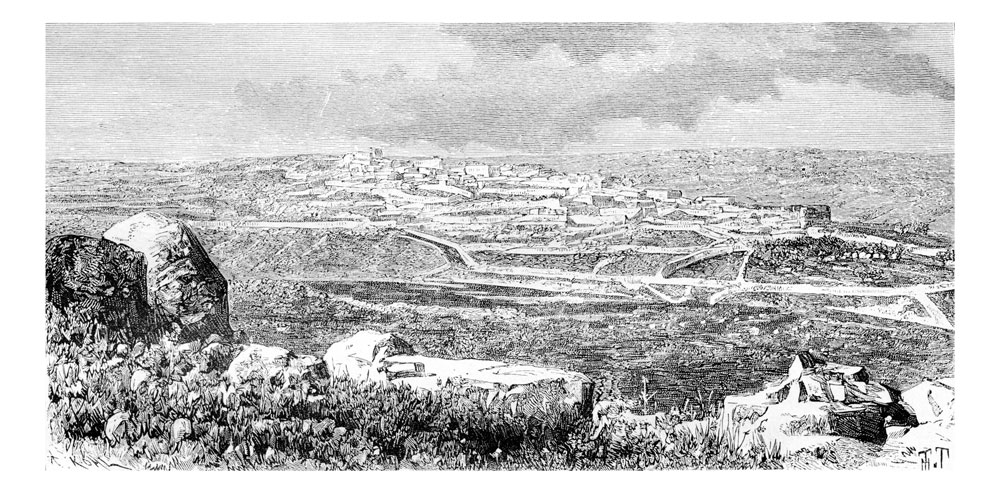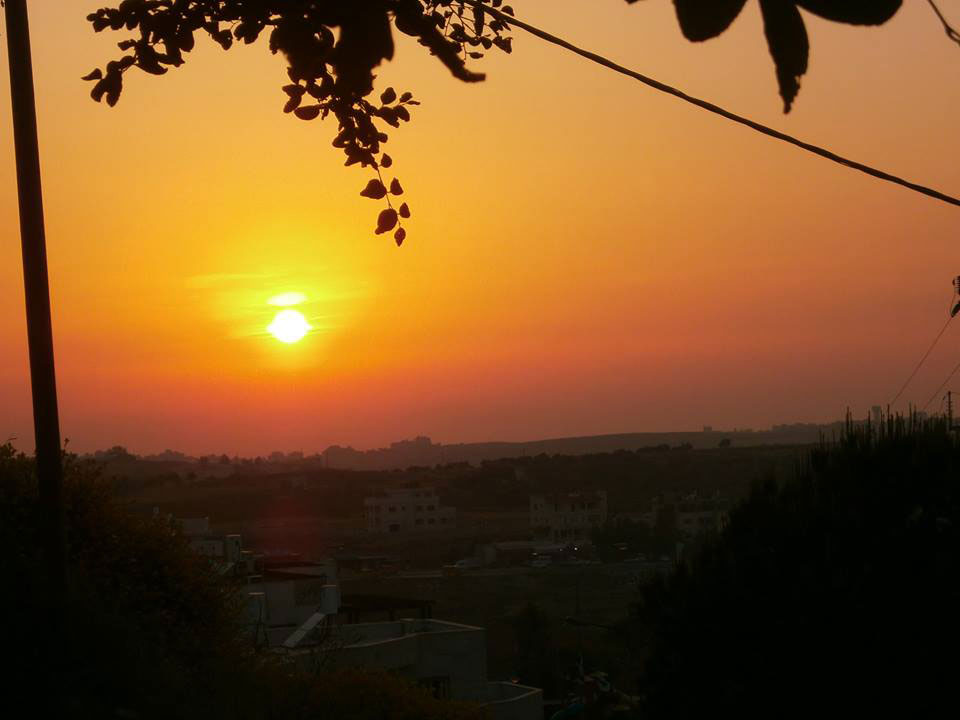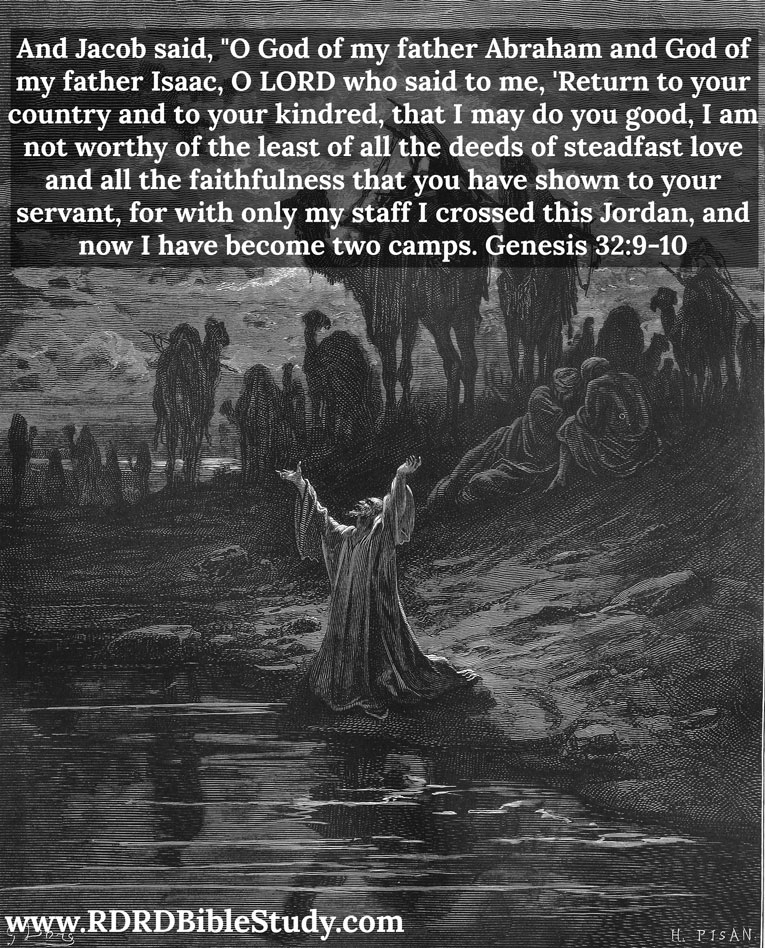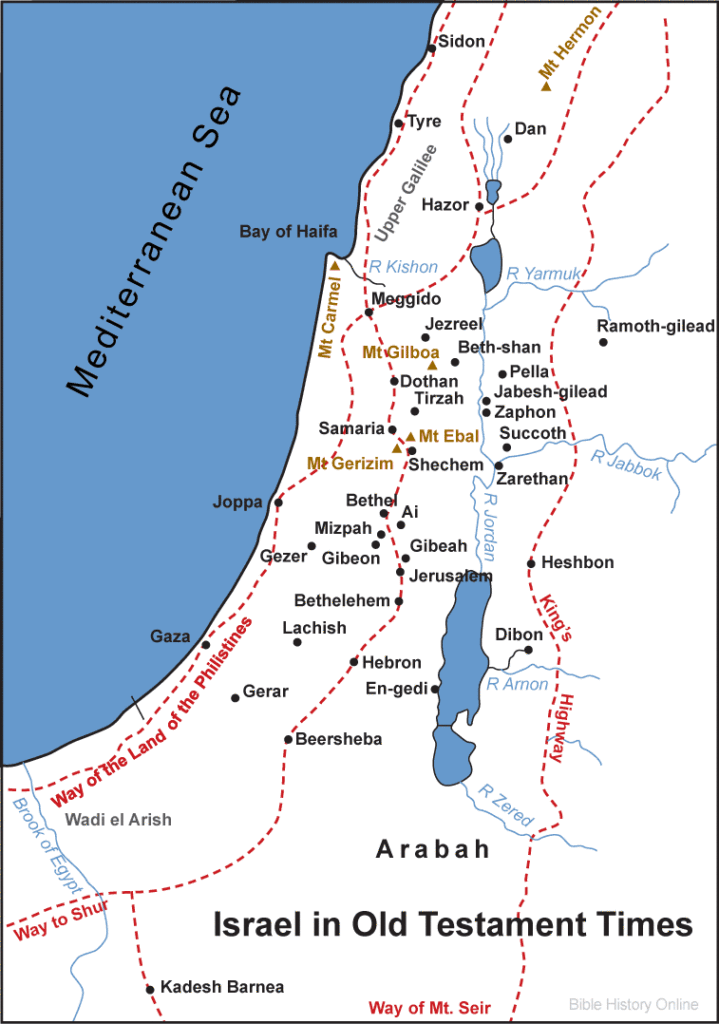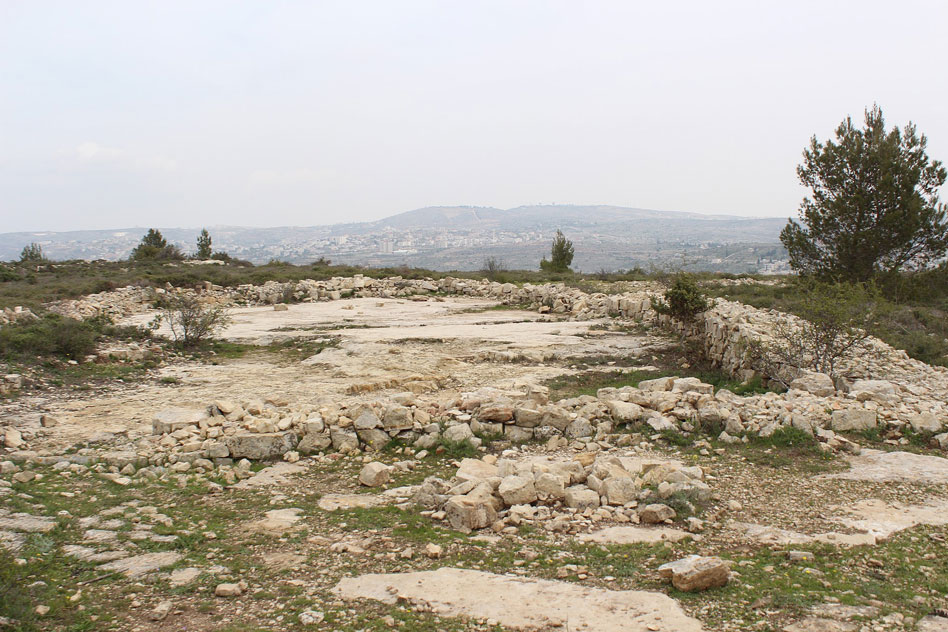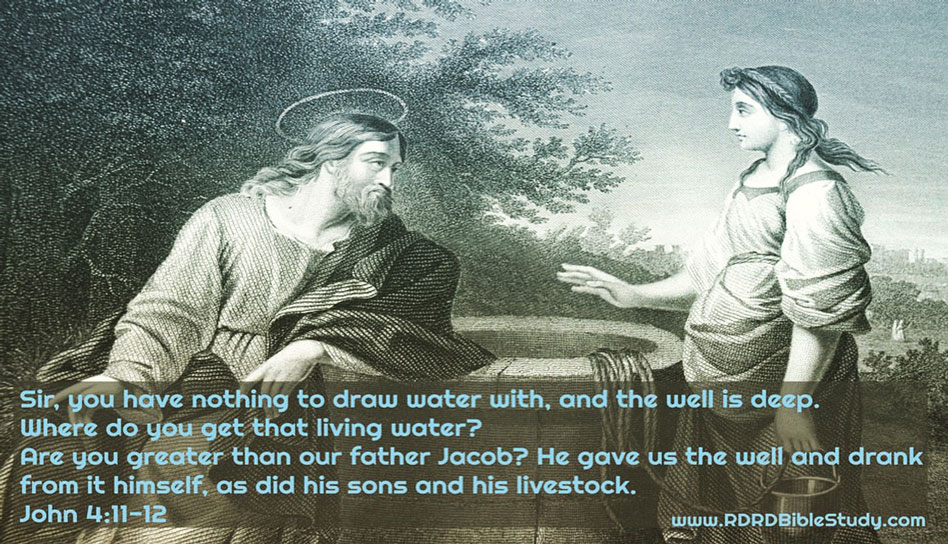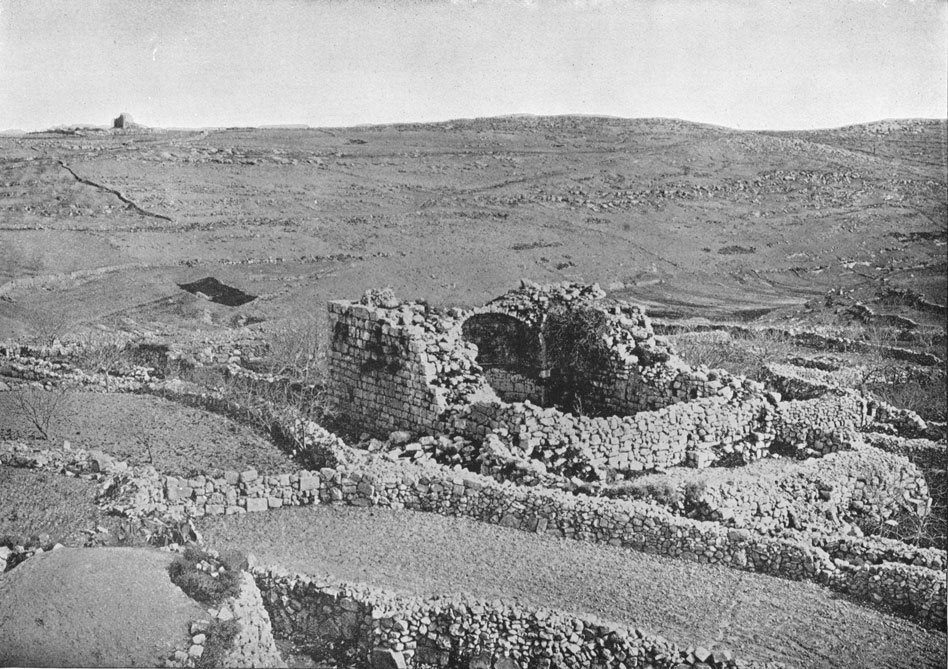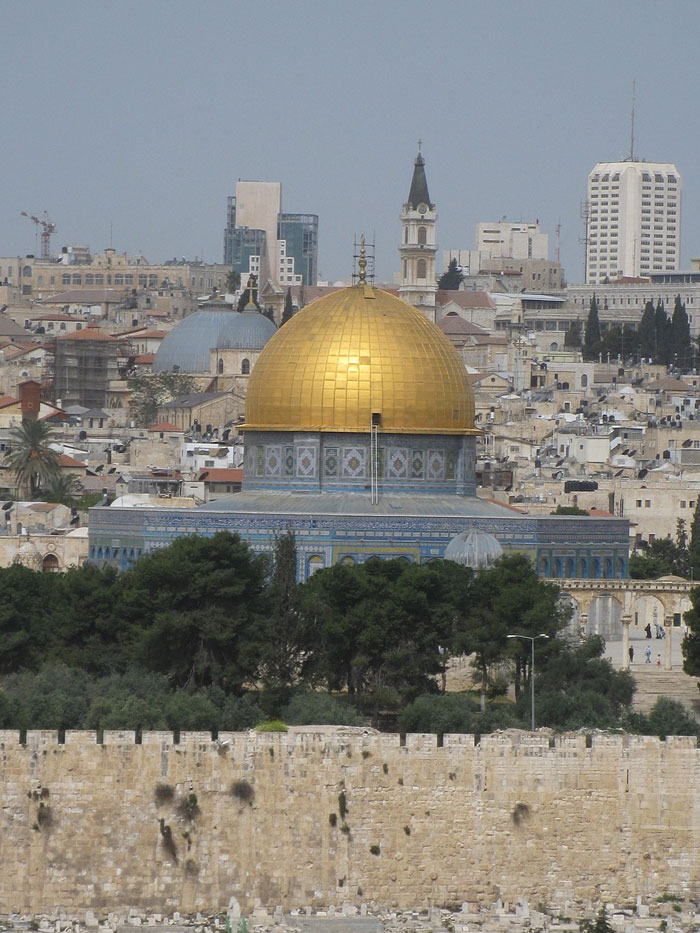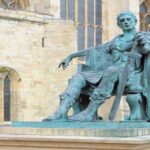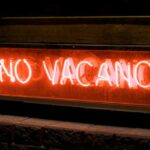If you had to guess the second most mentioned city in the Bible, what would you guess? Did you say Bethel? If so, you are correct! Scripture mentions Bethel 65 times, second only to Jerusalem (762 times).
According to Biblical record, after waking from the well-known “Jacob’s ladder” dream, the patriarch Jacob exclaimed “Awesome! This is none other than the House (Beth) of God (Elohim)!”
Bethel located at the northern border of Benjamin and southern border of Ephraim. Orange star is within Ephraim’s tribal allotment and the yellow star within Benjamin’s.
This ancient place and seat of worship is located on the southern border of Ephraim and the northern border of Benjamin. Early in Israel’s history it was designated as a place to worship Yahweh, even being the first “permanent” residence of the Ark of the Covenant.
After the schism between the Northern and Southern Kingdoms, Bethel became a place of false worship. The site became one of two places where the often mentioned King of Israel “Jeroboam the son of Nebat who made Israel to sin” set up one of two golden calves for Northern Kingdom worship.
The place of Bethel—which most scholars identify as modern day Beitin—is located in the southern part of the hill country of Samaria. It is 10-12 miles north of Jerusalem and 9 miles south of Shiloh.
Meaning Of Bethel In The OT
בֵּית אֵל
בֵּית אֵל (pronounced bait – el) means “the House of God”; in the Hebrew it is two words but typically written as the one word “Bethel” in English. It is also commonly written Beit-el, Beth-el, or Bet-el.
Genesis 28:19 He called the name of that place Bethel, but the name of the city was Luz at the first.
In the following verse, “the house of God” in the Hebrew is “the house of Elohim” the name commonly used for God in the OT.
Genesis 28:17 And he was afraid and said, “How awesome is this place! This is none other than the house of God, and this is the gate of heaven.”
Layout of the Land
Israel’s central mountain region, or hill country, extends all the way down from the mountains of Lebanon in the north. The western terrain rises sharply from the plains to these hills, a notable change for anyone driving from Tel Aviv to Jerusalem. The central range of mountains may be divided into sub-sections. From north to south these are Galilee, Samaria, Judea, and the Negev.
This amazing glimpse of Creation is from the Beit El Heritage Center English Facebook Page. It shows some girls from a nearby school enjoying the gorgeous view. The photo was taken near the traditional location where Jacob set up a stone for a pillar and anointed it with oil.
(Could you imagine growing up in a place so beautiful?)
Bethel is located in the southern part of the hill country of Samaria. This area has the higher mountains, rising to more than 3000 feet at the peak of Baal Hazor, just north of Bethel.
The Hills of Samaria are also known as “Mount Ephraim,” named after the Israelite tribe that settled in the southern part of it (Joshua 16). Ephraim and Manasseh, both sons of Joseph, settled in its northern part (Joshua 17; ½ of Manasseh settled east of the Jordan). Bethel lay on the northern boundary of Benjamin and the southern boundary of Ephraim.
When the northern kingdom made its capital in Samaria the region became known as Samaria also. While reading the Bible, keep in mind that Samaria may refer to the city or the region. Much of this region today is known as the West Bank.
Bethel is about 10-11 miles north of Jerusalem. It is at the intersection of the north-south road along the crest of the hill line and the east-west road from Trans-Jordan west by way of Jericho to the Mediterranean; either by way of the Valley of Aijalon (also spelled Ajalon) or via Gophna, to the coastal plain.
History At Bethel’s Location
Copper and Early Bronze
Bethel was both a Canaanite and Israelite town. It was the location of a village as early as 3200 B.C. However, evidence of the area being continuously occupied dates only from around 2000 B.C. (See Archaeological section for more info.)
Biblical Times
The following events move along the history of the Biblical period. For more detailed information related to Bethel during Biblical Times, see section Biblical References.
Patriarchal
Bethel was an important patriarchal site. It was the second place in the land that Abraham pitched his tent. He also built an altar there and called upon the name of the LORD (Gen. 12:8). After sojourning in Egypt, Abraham returned to Bethel and once again called upon the name of the LORD (Gen. 13:3-4). This is most likely the place where Abraham and Lot looked out over the Jordan Valley before separating from each other (Gen. 13:9-12). And the same place where God told Abraham to “lift up your eyes and look northward and southward and eastward and westward” promising him and his offspring all of the land that he could see—forever (Gen. 13:14-15).
Bethel was formerly named Luz, as the reader is reminded 4 times (Gen. 28:19; Gen. 35:6; Josh. 18:13; Judg. 1:23). The city’s name would have been Luz at the time of Abraham. Genesis 12 is using the later, more familiar name to indicate that the patriarch Abraham had been at this place (c.f. Gen. 14:14 where Abram pursues Lot’s captors as far as Dan, a tribal name of one of Jacob’s sons). And later on, that the patriarch Jacob, met with God, at the same place.
As Jacob traveled to Haran, he “came to a certain place” (Gen. 28:11), “place” being the Hebrew word used to indicate “sacred site.” This is assuredly the place where Abraham had built an altar (Gen. 18:8) and viewed the Jordan valley (Gen. 13:9).According to Genesis, the city received its name from the patriarch Jacob. When the sun had set during his journey to Haran, Jacob lay down to sleep. As he slept, he had the well-known “Jacob’s ladder’ vision of the angels of God ascending and descending a ladder between heaven and earth. Then he saw Yahweh standing above the ladder:
And behold, the LORD stood above it and said, “I am the LORD, the God of Abraham your father and the God of Isaac. The land on which you lie I will give to you and to your offspring.14 Your offspring shall be like the dust of the earth, and you shall spread abroad to the west and to the east and to the north and to the south, and in you and your offspring shall all the families of the earth be blessed.15 Behold, I am with you and will keep you wherever you go, and will bring you back to this land. For I will not leave you until I have done what I have promised you.” Genesis 28:13-15
When Jacob awoke, the enormity of what had taken place became a reality:
Then Jacob awoke from his sleep and said, “Surely the LORD is in this place, and I did not know it.” 17 And he was afraid and said, “How awesome is this place! This is none other than the house of God, and this is the gate of heaven.” 18 So early in the morning Jacob took the stone that he had put under his head and set it up for a pillar and poured oil on the top of it. 19 He called the name of that place Bethel, but the name of the city was Luz at the first. Genesis 28:16-19
After The Conquest
The Ark of the Covenant was located in Bethel for a while (Judges 20:18). Bethel was also a town regularly visited by prominent OT prophets
The Fall of Samaria/Israel/Northern Kingdom
It appears that Bethel escaped destruction when Samaria fell to Assyria, since no archaeological data has been found suggesting otherwise. Priests still taught there after Samaria was destroyed (2 Kings 17:28).
Later, Josiah captured the city, demolished the altar that Jeroboam son of Nebat had set up, and defiled the site (2 Kings 23:15) This was all prophesied by the man of God from Judah.
The Babylonians destroyed the city in their second invasion (587-576 B.C.).
In the Persian period Bethel was included in the territory of Judah (Ezra 2:28; Neh. 7:32).
Early Church
Eusebius of Caesarea described Bethel as a large village in the 4th century A.D. Jerome also refers to Bethel as a village that lay 12 Roman miles north of Jerusalem, to the right or east of the road leading to Neapolis.
Byzantine
Ruins of al-Burj, 1935
According to some scholars, when the Crusaders arrived at the traditional site of Bethel, they found the ruins of a Byzantine church. They built another and placed it first under the Abbey of St. Joseph of Arimathea, later under the Canons of the Holy Sepulcher. The ruins of the Burj are about 1 meter tall, and apparently built on the older ruins of a Byzantine monastery. Some have believed that it was constructed on the site where Abraham built an altar. According to biblical scholar Edward Robinson who visited Palestine in the 19th century, al-Burj Beitin consisted of dilapidated stones that used to form part of a fortress and a Greek church.
On a ridge east of Bethel an important Byzantine church was built, perhaps marking the traditional site of Jacob’s dream. Another church was built in the 6th century to commemorate the site of Abraham’s sanctuary. The city reached its greatest size and prosperity during the Byzantine era. The population was Eastern Orthodox Christian.
The church fell into ruin after the Islamic Rashidun army conquered the area, but was rebuilt by the Crusaders in the 12th century. During the Crusader period, the village was given to the Church of the Holy Sepulchre. After the Crusaders were defeated by the Ayyubid forces of Saladin in 1187, the church was destroyed and the village was abandoned.
Modern
The location of biblical Bethel has been identified as the modern Beitin. This area stands on a knoll East of the road to Nablus, the biblical city of Shechem. An Israeli settlement named Beit El is also located within the region near the traditional site of Jacob’s dream.
Modern scholar Edward Robinson identified the village of Beitin in the West Bank with ancient Bethel in his renowned work, Biblical Researches in Palestine, 1838–52. He based this assessment on its fitting the location described in earlier texts, and on the philological similarities between the modern and ancient name beth and beit, differences resolved easily because of transliteration. According to Robinson, the replacement of the Hebrew el with the Arabic in was not unusual.
Town of Beitin in West Bank, Israel, vintage engraved illustration. Le Tour du Monde, Travel Journal, 1881
BIBLICAL REFERENCES
Patriarchal Narratives
After Abraham entered the land, he passed through and came to Shechem (Gen. 12:6). At this place God promised the land to Abraham’s offspring, and Abraham built an altar and worshipped God (Gen. 12:7). From there he traveled to the hill country east of Bethel:
Genesis 12:8 From there he moved to the hill country on the east of Bethel and pitched his tent, with Bethel on the west and Ai on the east. And there he built an altar to the LORD and called upon the name of the LORD.
Abraham travels to Egypt. Upon reentering the land, he returns to the place where he had built an altar between Bethel and Ai. Based on context, and certainly Genesis 13:3 dictates it, the Hebrew word for “place” indicates a “sacred site.”
Genesis 13:3 And he journeyed on from the Negeb as far as Bethel to the place where his tent had been at the beginning, between Bethel and Ai.
In Genesis 28:10-11, Jacob travels to Haran (where Rachel’s father Laban lives; also the home of Abraham prior to entering the land, Gen. 11:28-32; 12:4-5). Verse 11 says “he came to a certain place.” This is the same word from Genesis 13:3’s “place.” Once again the context dictates the meaning “sacred site.” The use of place and the site of Bethel is almost assuredly the same place that Abraham had built an altar.
Genesis 28:10-11 Jacob left Beersheba and went toward Haran. 11 And he came to a certain place and stayed there that night, because the sun had set. Taking one of the stones of the place, he put it under his head and lay down in that place to sleep.
Sunset at Beit-El. How was Jacob able to sleep with this view?
This photo is from the Beit El Heritage Center English Facebook Page. Check it out! You will be glad you did.
Jacob awakes from his dream and refers once again to “this place.”
Genesis 28:16-17 Then Jacob awoke from his sleep and said, “Surely the LORD is in this place, and I did not know it.” 17 And he was afraid and said, “How awesome is this place! This is none other than the house of God, and this is the gate of heaven.”
Jacob names the place “Bethel.”
Genesis 28:19 He called the name of that place Bethel, but the name of the city was Luz at the first.
While in Haran, tensions escalate between Jacob and Laban. The angel of the LORD appears to Jacob in another dream. God reveals Himself by saying “I am the God of Bethel.” By alluding to the place where the vision had occurred, God’s self-revelation reminds Jacob of his earlier vow to return to the land (Gen. 28:21).
Jacob and his family return to the land. Prior to meeting Esau, the well-known account of Jacob wrestling with an angel occurs. Here Jacob is renamed “Israel” and he names the place where this happens “Peniel.” This passage does not mention Bethel, but is included because of the contextual richness of covenant throughout this section.Genesis 31:13 I am the God of Bethel, where you anointed a pillar and made a vow to me. Now arise, go out from this land and return to the land of your kindred.'”
Genesis 32:24-30 And Jacob was left alone. And a man wrestled with him until the breaking of the day. 25 When the man saw that he did not prevail against Jacob, he touched his hip socket, and Jacob’s hip was put out of joint as he wrestled with him. 26 Then he said, “Let me go, for the day has broken.” But Jacob said, “I will not let you go unless you bless me.” 27 And he said to him, “What is your name?” And he said, “Jacob.” 28 Then he said, “Your name shall no longer be called Jacob, but Israel, for you have striven with God and with men, and have prevailed.” 29 Then Jacob asked him, “Please tell me your name.” But he said, “Why is it that you ask my name?” And there he blessed him. 30 So Jacob called the name of the place Peniel, saying, “For I have seen God face to face, and yet my life has been delivered.”
After this Jacob is reconciled with Esau. Then he travels to Shechem. Here, his daughter Dinah is raped by the prince of the place, and Simeon and Levi seek retribution. After this incident, God tells Jacob to dwell in Bethel.
Genesis 35:1, 3, 6 God said to Jacob, “Arise, go up to Bethel and dwell there. Make an altar there to the God who appeared to you when you fled from your brother Esau.”
3 Then let us arise and go up to Bethel, so that I may make there an altar to the God who answers me in the day of my distress and has been with me wherever I have gone.”
6 And Jacob came to Luz (that is, Bethel), which is in the land of Canaan, he and all the people who were with him.
Deborah, Rebekah’s nurse, dies and is buried near Bethel.
Genesis 35:8 And Deborah, Rebekah’s nurse, died, and she was buried under an oak below Bethel. So he called its name Allon-bacuth.
A reiteration of the name
Genesis 35:15-16 So Jacob called the name of the place where God had spoken with him Bethel. 16 Then they journeyed from Bethel. When they were still some distance1 from Ephrath, Rachel went into labor, and she had hard labor.
OT Map of Israel
Conquest of the Land
Upon entry into the land, Joshua sends men to spy on Ai, which is described east of Bethel.
Joshua 7:2 Joshua sent men from Jericho to Ai, which is near Beth-aven, east of Bethel, and said to them, “Go up and spy out the land.” And the men went up and spied out Ai.
Preparing to take Ai, the people set an ambush between Bethel and Ai, and men from both cities attack Israel.
Joshua 8:9 So Joshua sent them out. And they went to the place of ambush and lay between Bethel and Ai, to the west of Ai, but Joshua spent that night among the people.
Joshua 8:12 He took about 5,000 men and set them in ambush between Bethel and Ai, to the west of the city.
Joshua 8:17 Not a man was left in Ai or Bethel who did not go out after Israel. They left the city open and pursued Israel.
Included in the list of the Canaanite kings conquered by Joshua.
Joshua 12:9 the king of Jericho, one; the king of Ai, which is beside Bethel, one.
Joshua 12:16 the king of Makkedah, one; the king of Bethel, one.
Distribution of the Land to the Twelve Tribes
Joshua 16:1 The allotment of the people of Joseph went from the Jordan by Jericho, east of the waters of Jericho, into the wilderness, going up from Jericho into the hill country to Bethel.
Joshua 16:2 Then going from Bethel to Luz, it passes along to Ataroth, the territory of the Archites.
Joshua 18:13 From there the boundary passes along southward in the direction of Luz, to the shoulder of Luz (that is, Bethel), then the boundary goes down to Ataroth-addar, on the mountain that lies south of Lower Beth-horon.
Joshua 18:22 Beth-arabah, Zemaraim, Bethel.
Judges
After Joshua’s death, the people continue the conquest.
Judges 1:22-23 The house of Joseph also went up against Bethel, and the LORD was with them. 23 And the house of Joseph scouted out Bethel. ( Now the name of the city was formerly Luz.)
A place central to the surrounding towns used by the judge Deborah.
Judges 4:5 She used to sit under the palm of Deborah between Ramah and Bethel in the hill country of Ephraim, and the people of Israel came up to her for judgment.
Because of the evil done in Benjamin, the people of Israel planned to fight against them. First they go up to Bethel to inquire of God.
Judges 20:18 The people of Israel arose and went up to Bethel and inquired of God, “Who shall go up first for us to fight against the people of Benjamin?” And the LORD said, “Judah shall go up first.”
The Benjamites were victorious against the men of Israel in the first two battles. After each defeat the people of Israel go up to Bethel to weep and worship before God. The first time (v. 23) they do this, Scripture does not mention Bethel. But that they “went up” implies the worship site at Bethel.
Judges 20:26 Then all the people of Israel, the whole army, went up and came to Bethel and wept. They sat there before the LORD and fasted that day until evening, and offered burnt offerings and peace offerings before the LORD.
Narration of the next battle describing approximate location of fatalities.
Judges 20:31 And the people of Benjamin went out against the people and were drawn away from the city. And as at other times they began to strike and kill some of the people in the highways, one of which goes up to Bethel and the other to Gibeah, and in the open country, about thirty men of Israel.
The people of Israel once again weep before God. This time, because the tribe of Benjamin will have no descendants.
Judges 21:2 And the people came to Bethel and sat there till evening before God, and they lifted up their voices and wept bitterly.
The people of Israel plan to correct the situation with the Tribe of Benjamin; once again Bethel is used as a reference point to describe a location.
Judges 21:19 So they said, “Behold, there is the yearly feast of the LORD at Shiloh, which is north of Bethel, on the east of the highway that goes up from Bethel to Shechem, and south of Lebonah.”
Historical Narratives
The prophet Samuel’s circuit included Bethel.
1 Samuel 7:16 And he went on a circuit year by year to Bethel, Gilgal, and Mizpah. And he judged Israel in all these places.
Saul receives instructions from Samuel about being anointed king.
1 Samuel 10:3 Then you shall go on from there further and come to the oak of Tabor. Three men going up to God at Bethel will meet you there, one carrying three young goats, another carrying three loaves of bread, and another carrying a skin of wine.
Saul sets up to battle the Philistines.
1 Samuel 13:2 Saul chose three thousand men of Israel. Two thousand were with Saul in Michmash and the hill country of Bethel, and a thousand were with Jonathan in Gibeah of Benjamin. The rest of the people he sent home, every man to his tent.
After David defeated Ziklag, he sent spoil to his friends, elders of Judah, for those in all the places where he had roamed. Bethel is listed as one of these places.
1 Samuel 30:27 It was for those in Bethel, in Ramoth of the Negeb, in Jattir,
Jeroboam, the first king of the Northern Kingdom, sets up golden calves in Bethel and Dan. He did this to deter the people from going to Jerusalem to offer sacrifices at the temple. He feared they would return their allegiance to the Southern Kingdom of Judah and the Davidic monarchy.
1 Kings 12:29 And he set one in Bethel, and the other he put in Dan.
Jeroboam set up feasts and priests in Bethel to rival Jerusalem.
1 Kings 12:32-33 And Jeroboam appointed a feast on the fifteenth day of the eighth month like the feast that was in Judah, and he offered sacrifices on the altar. So he did in Bethel, sacrificing to the calves that he made. And he placed in Bethel the priests of the high places that he had made. 33 He went up to the altar that he had made in Bethel on the fifteenth day in the eighth month, in the month that he had devised from his own heart. And he instituted a feast for the people of Israel and went up to the altar to make offerings.
Ruins of Jeroboam’s Temple in Beit-El.
God sends a prophet from Judah to prophesy against Jeroboam’s apostasy
1 Kings 13:1, 4 And behold, a man of God came out of Judah by the word of the LORD to Bethel. Jeroboam was standing by the altar to make offerings. 4 And when the king heard the saying of the man of God, which he cried against the altar at Bethel, Jeroboam stretched out his hand from the altar, saying, “Seize him.” And his hand, which he stretched out against him, dried up, so that he could not draw it back to himself.
The man of God from Judah leaves and the old prophet in Bethel begins a plot of deception.
1 Kings 13:10-11 So he went another way and did not return by the way that he came to Bethel. 11 Now an old prophet lived in Bethel. And his sons1 came and told him all that the man of God had done that day in Bethel. They also told to their father the words that he had spoken to the king.
After the old prophet of Bethel deceives the man of God from Judah, the old prophet “prophesies” that everything spoken by the man of God from Judah would come to pass.
1 Kings 13:32 For the saying that he called out by the word of the LORD against the altar in Bethel and against all the houses of the high places that are in the cities of Samaria shall surely come to pass.”
A man from Bethel named Hiel rebuilt Jericho in defiance of the word of God spoken by Joshua after Jericho was destroyed. In context, the verses prior to 1 Kings 16:34, vv. 30-33 begins the narration of Ahab, the king of Israel—he took the Sidonian king’s daughter, Jezebel, as wife, built an altar to Baal in Samaria, and made an Asherah. That Biel, from the golden calf worship site of Bethel, rebuilds Jericho, shows the ever-increasing apostasy and lack of regard for God’s commands by the Northern Kingdom.
1 Kings 16:34 In his days Hiel of Bethel built Jericho. He laid its foundation at the cost of Abiram his firstborn, and set up its gates at the cost of his youngest son Segub, according to the word of the LORD, which he spoke by Joshua the son of Nun.
Joshua 6:26 Joshua laid an oath on them at that time, saying, “Cursed before the LORD be the man who rises up and rebuilds this city, Jericho. “At the cost of his firstborn shall he lay its foundation, and at the cost of his youngest son shall he set up its gates.”
Elijah and Elisha travel to Bethel from Gilgal. Some scholars argue that several ancient places were named “Gilgal” and that this is one near Bethel. Others argue this is the Gilgal where the Hebrew people camped after crossing the Jordan. Either way, the two prophets would have been together for several days as they traveled to Bethel and other places located on the prophetic circuit—knowing that God was about to take Eliijah “up.” [Wonder what they talked about on the road?]
2 Kings 2:1-3 Now when the LORD was about to take Elijah up to heaven by a whirlwind, Elijah and Elisha were on their way from Gilgal. And Elijah said to Elisha, “Please stay here, for the LORD has sent me as far as Bethel.” But Elisha said, “As the LORD lives, and as you yourself live, I will not leave you.” So they went down to Bethel. 3 And the sons of the prophets who were in Bethel came out to Elisha and said to him, “Do you know that today the LORD will take away your master from over you?” And he said, “Yes, I know it; keep quiet.”
Elisha returns to Bethel and is taunted by some young boys.
2 Kings 2:23 He went up from there to Bethel, and while he was going up on the way, some small boys came out of the city and jeered at him, saying, “Go up, you baldhead! Go up, you baldhead!”
King Jehu destroyed the Baals in Israel, but he left the atrocities in Bethel and Dan.
2 Kings 10:29 But Jehu did not turn aside from the sins of Jeroboam the son of Nebat, which he made Israel to sin – that is, the golden calves that were in Bethel and in Dan.
2 Kings 17:28 So one of the priests whom they had carried away from Samaria came and lived in Bethel and taught them how they should fear the LORD.
Part of Josiah’s reform was to fulfill the word spoken against Jeroboam by the man of God sent from Judah.
2 Kings 23:4 And the king commanded Hilkiah the high priest and the priests of the second order and the keepers of the threshold to bring out of the temple of the LORD all the vessels made for Baal, for Asherah, and for all the host of heaven. He burned them outside Jerusalem in the fields of the Kidron and carried their ashes to Bethel.
King Josiah destroys Jeroboam’s golden calf altar in Bethel.
2 Kings 23:15 Moreover, the altar at Bethel, the high place erected by Jeroboam the son of Nebat, who made Israel to sin, that altar with the high place he pulled down and burned,reducing it to dust. He also burned the Asherah.
Josiah leaves the tomb of the man of God who prophesied against Bethel; and destroys the high places found in Israel.
2 Kings 23:17, 19 Then he said, “What is that monument that I see?” And the men of the city told him, “It is the tomb of the man of God who came from Judah and predicted1 these things that you have done against the altar at Bethel.” 19 And Josiah removed all the shrines also of the high places that were in the cities of Samaria, which kings of Israel had made, provoking the LORD to anger. He did to them according to all that he had done at Bethel.
Another account of the distribution of land.
1 Chronicles 7:28 Their possessions and settlements were Bethel and its towns, and to the east Naaran, and to the west Gezer and its towns, Shechem and its towns, and Ayyah and its towns.
Abijah, King of Judah, takes cities from Jeroboam, the King of Israel.
2 Chronicles 13:19 And Abijah pursued Jeroboam and took cities from him, Bethel with its villages and Jeshanah with its villages and Ephron1 with its villages.
In the registery of those who returned from Babylonian captivity.
Ezra 2:28 The men of Bethel and Ai, 223.
Nehemiah 7:32 The men of Bethel and Ai, 123.
Upon the return from Babylon, the Benjamites settled in Bethel and the surrounding villages.
Nehemiah 11:31 The people of Benjamin also lived from Geba onward, at Michmash, Aija, Bethel and its villages,
Major and Minor Prophets
Bethel received much prophetic attention due to corrupt religion and the affluent life of the people in the whole region.
Jeremiah prophesied after the exile of the Northern Kingdom of Israel and before and during the 3 deportations of the kingdom of Judah to Babylon. The last deportation in A.D. 586 occurred simultaneous with the army of Babylon burning the temple and destroying the city of Jerusalem.
Isaiah, Jeremiah, and Ezekiel all contain prophetic oracles spoken against the surrounding nations. Against Moah, Jeremiah says, there will come a day when they will be ashamed of Chemosh, the primary god of Moab, just as Israel was ashamed of Bethel, their confidence. “Bethel” is used poetically to indicate the idolatrous worship of the golden calves. The Northern Kingdom put their confidence in the golden calf, yet they were taken into captivity anyway—their “confidence” was not able to save them. Likewise, Chemosh will not be able to save Moab.
Jeremiah 48:13 Then Moab shall be ashamed of Chemosh, as the house of Israel was ashamed of Bethel, their confidence.
According to TWOT:
In two aspects, the separation between Yahweh and Chemosh is clear. One is the idolatry of Chemosh. So long as he was represented by an image he was subject to this world. He could go into captivity (Jer 48:7) and Yahweh could not. As an embodiment of this world he could only fail Moab as Israel’s bulls had failed her (Jer 48:13).
Hosea prophesied against the Northern Kingdom and the false religious practices initiated by Jeroboam.
Hosea 10:15 Thus it shall be done to you, O Bethel, because of your great evil. At dawn the king of Israel shall be utterly cut off.
Hosea 12:4 He strove with the angel and prevailed; he wept and sought his favor. He met God at Bethel, and there God spoke with us.
Amos was from the Southern Kingdom of Judah, but prophesied against the Northern Kingdom of Israel.
Amos 3:14 “that on the day I punish Israel for his transgressions, I will punish the altars of Bethel, and the horns of the altar shall be cut off and fall to the ground.
Amos 4:4 “Come to Bethel, and transgress; to Gilgal, and multiply transgression; bring your sacrifices every morning, your tithes every three days;
Amos 5:5-6 but do not seek Bethel, and do not enter into Gilgal or cross over to Beersheba; for Gilgal shall surely go into exile, and Bethel shall come to nothing.” 6 Seek the LORD and live, lest he break out like fire in the house of Joseph, and it devour, with none to quench it for Bethel.
Amos 7:10-13 Then Amaziah the priest of Bethel sent to Jeroboam king of Israel, saying, “Amos has conspired against you in the midst of the house of Israel. The land is not able to bear all his words. 11 For thus Amos has said, “‘ Jeroboam shall die by the sword, and Israel must go into exile away from his land.'” 12 And Amaziah said to Amos, “O seer, go, flee away to the land of Judah, and eat bread there, and prophesy there, 13 but never again prophesy at Bethel, for it is the king’s sanctuary, and it is a temple of the kingdom.”
The Babylonian army entered Jerusalem during the fifth month of 586 B.C. and burned the temple and the king’s house. Except for the very poor, they took the people captive to Babylon. (2 Kings 25:8-9; Jere. 52:12). Men from Bethel ask Zechariah if they should continue to mourn and fast for this occasion. God rebukes them for their hypocritical fasting.
Zechariah 7:2-7 Now the people of Bethel had sent Sharezer and Regem-melech and their men to entreat the favor of the LORD, 3 saying to the priests of the house of the LORD of hosts and the prophets, “Should I weep and abstain in the fifth month, as I have done for so many years?” 4 Then the word of the LORD of hosts came to me: 5 “Say to all the people of the land and the priests, When you fasted and mourned in the fifth month and in the seventh, for these seventy years, was it for me that you fasted? 6 And when you eat and when you drink, do you not eat for yourselves and drink for yourselves? 7 Were not these the words that the LORD proclaimed by the former prophets, when Jerusalem was inhabited and prosperous, with her cities around her, and the South and the lowland were inhabited?”
Intertestament Period
Bethel became a Hellenistic town during the expansion of Alexander the Great (334-323 B.C.). When the Macedon Empire split, the Seleucid Dynasty (312-63 B.C.) ruled the area of Judah. A Jewish revolt led by Judah the Maccabee defeated the Seleucid army. Some years later, the Seleucid empire began to lose power, and Judah’s brother, Simon Maccabaeus, established the Hasmonean Dynasty which ruled the region 140-116 B.C.
During the period of Hasmonean guerilla warfare, Bethel was fortified by Seleucid general Bacchides.
1 Maccabees 9:50 Bacchides then returned to Jerusalem and built strong cities in Judea: the fortress in Jericho, and Emmaus, and Bethhoron, and Bethel, and Timnath, and Pharathon, and Tephon, with high walls and gates and bars.
Antiquities of the Jews 13:12-16 But when Bacchides knew that Jonathan had pitched his camp among the lakes of Jordan, he observed when their Sabbath day came, and then assaulted him, [as supposing that he would not fight because of the law for resting on that day]: 13 but he exhorted his companions [to fight]; and told them that their lives were at stake, since they were surrounded by the river, and by their enemies, and had no way to escape, for that their enemies pressed upon them from before, and the river was behind them. So, after he had prayed to God to give them the victory, he joined battle with the enemy, 14 of whom he overthrew many; and as he saw Bacchides coming up boldly to him, he stretched out his right hand to smite him; but the other foreseeing and avoiding the stroke, Jonathan with his companions leaped into the river, and swam over it, and by that means escaped beyond Jordan while the enemies did not pass over that river; but Bacchides returned presently to the citadel at Jerusalem, having lost about two thousand of his army. 15 He also fortified many cities of Judea, whose walls had been demolished; Jericho, and Emmaus, and Bethhoron, and Bethel, and Timnathserah, and Pharatho, and Tephon, and Gazara, 16 and built towers in everyone of these cities, and surrounded them with strong walls, that were very large also, and put garrisons into them, that they might issue out of them, and do mischief to the Jews.
As the Seleucid Empire continued to decline, the Hasmonean Dynasty became fully independent, even expanding into the neighbouring regions of Samaria, Galilee, Iturea, Perea, and Idumea. They took the title of “king” signifying a continuation of the Davidic kingship. Some modern scholars refer to this period as an independent kingdom of Israel.
New Testament
No specific reference to Bethel exists in the NT. However, it seems plausible that Christ must have traveled through the city on His many trips throughout neighboring regions. For instance, Bethel is on the main north-south road from Jerusalem to Shechem which is near Sychar (John 4).Roman Rule
In 69 A.D. the Roman Emperor Vespasian captured Bethel as he approached Jerusalem. He turned the city into a flourishing Roman town.
The Jewish War 4:550-551 but in the meantime Vespasian left Caesarea, on the fifth day of the month of Daisios [Sivan], (Niese: June 23, Capellus: June 5) and marched against those places of Judea which were not yet overthrown. 551 So he went up to the mountainous country, and took those two districts called Gophna and Acrabatta. After which he took Bethel and Ephraim, two small cities; and when he had put garrisons into them, he rode as far as Jerusalem, in which march he took many prisoners, and many captives;
Archaeological
Bethel. From the book Holy Land Photographed by Daniel B. Shepp. 1894.
The earliest archaeological evidence for occupation of the high place at Bethel is a Copper Age water jar from 3500 B.C. No structures from this time exist, suggesting the area was an open-air sanctuary.
Evidence of occupation around 3200 B.C. and then again from 2400-2200 B.C. exists. However, evidence for continual occupation does not occur until the 19th century B.C. At this time, a temple was built on the high place as well as a small town to the south.
The patriarchal narratives which occur in the Middle Bronze period fit well into the archaeological history of Bethel. Both Abraham and Jacob would have found a well-developed town.
Absence of Late Bronze I material suggests that the site was destroyed about 1550 B.C. when Egypt expelled the Hyskos from Egypt and Canaan. In the 14th and 13th centuries B.C., evidence exists that the area was prosperous.
Return From Babylonian Exile
Literary references to Bethel are not found in early Hellenistic documents. However, archaeological evidence supports Scripture’s witness to occupation at this time (Exra 2:28; Nehemiah 7:32, 11:31).
Biblical Observations
The awesome vision that overwhelmed Jacob at Bethel to the point that he exclaimed “This is the House of God! This is heaven’s gate” is remarkable. Later, when Bethel became the first “permanent” home for the Ark in the Promised Land demonstrates that the patriarchal tradition of Bethel’s sacredness had been passed down to subsequent generations of Hebrews. Even during the period of Egyptian slavery.
Bethel’s association with Jacob made the place even more special for the former slaves. After Jacob died, his sons carried his bones from Egypt to the Promised Land for burial (Gen. 49:29-32; 50:12-14), then the sons returned to Egypt. But their relative, already in the land they were to inherit and inhabit, was a sure sign that the covenantal promises (Gen. 15:7) would be fulfilled (Gen. 15:16). Certainly as the slavery grew more and more harsh, the sure hope of their already but not yet presence in the Promised Land gave them consolation, as they faithfully awaited God’s visitation.
And after 400 years in Egypt, the promise is fulfilled, and here is the Ark and the chosen nation of God—in the Promised Land, worshipping God at Bethel, where their father Jacob had such an awesome vision of the LORD.
Bethel has such a remarkable place in Israel’s history, which makes it all the more tragic that Jeroboam set up a false system of worship “to make Israel to sin.”
The narrative of Jeroboam’s golden calves uses language similar to the golden calf incident at Mt. Sinai, recalling God’s intense displeasure.
And he received the gold from their hand and fashioned it with a graving tool and made a golden calf. And they said, “These are your gods, O Israel, who brought you up out of the land of Egypt!” Exodus 32:4
So the king took counsel and made two calves of gold. And he said to the people, “You have gone up to Jerusalem long enough. Behold your gods, O Israel, who brought you up out of the land of Egypt.” 1 Kings 12:28
In the desert 3,000 men fell because of the sword (Exod. 32:28) and God sent a plague on the people (Exod. 32:35) demonstrating His judgment on those who disobey Him. Likewise, God’s judgment would befall all of those who persisted in the worship at Bethel and Dan, and failed to heed the warnings of God’s prophets.
By the time Hosea prophesies against the Northern Kingdom their idolatry includes Baal and Asherah worship. He refers poetically to Bethel and the calves (saying a lot with a little):
Hosea 8:5 I have spurned your calf, O Samaria. My anger burns against them. How long will they be incapable of innocence?
Hosea 8:6 For it is from Israel; a craftsman made it; it is not God. The calf of Samaria shall be broken to pieces.
Hosea 13:2 And now they sin more and more, and make for themselves metal images, idols skillfully made of their silver, all of them the work of craftsmen. It is said of them, “Those who offer human sacrifice kiss calves!”
Near Bethel was a city named Beth-Aven, which in Hebrew translates “house of iniquity.” When the people were told not to “go up to Beth-Aven,” Hosea was using a play on words to say “do not go up to sin.” Because of its proximity and similar topography, it would have been understood by the people to indicate Bethel.
Hosea 4:15 Though you play the whore, O Israel, let not Judah become guilty. Enter not into Gilgal, nor go up to Beth-aven, and swear not, “As the LORD lives.”
Here Hosea uses the same play on words, saying “do not tremble for the calf of the house of iniquity” because the people had turned Beth-el (House of God) into Beth-Aven (House of Iniquity).
Hosea 10:5 The inhabitants of Samaria tremble for the calf of Beth-aven. Its people mourn for it, and so do its idolatrous priests- those who rejoiced over it and over its glory- for it has departed from them.
Dome of the Rock located on the Temple Mount; Church of the Holy Sepulchre towering above Jerusalem in the background.
Sadly, it is common for idolatrous worship to be set up on the once sacred worship sites of Yahweh, the Creator of the universe, God of Israel, and Father of Jesus Christ. But hasn’t satan, since the beginning, wanted to “be like God”? Even the sacred site of Bethel (and Jerusalem) weren’t immune to the devil’s urgent prowling.
Homework:
1 and 2 Kings frequently speak of “high places.” The OT prophets frequently refer “to every high hill.” How does reading about Bethel help you understand these passages? Leave a message!
1 Kings 11:6-8
Ezekiel 34:6
Until Next Time—
The grace of the Lord Jesus Christ and the love of God and the fellowship of the Holy Spirit be with you all. 2 Corinthians 13:14
Resources
M. Jamieson “Bethel” in The Zondervan Pictorial Encyclopedia of the Bible vol 1, Gen ed. Merrill C. Tenney (Grand Rapids: Zondervan, 1975) 531-535.
“Chemosh” in Theological Wordbook of the Old Testament, Vols. 1-2, ed. R. Laird Harris, assoc. eds. Gleason L. Archer, Jr. and Bruce K. Waltke (Chicago: Moody Press, 1991) accessed in BibleWorks Software.
This is an awesome aerial view of Bethel http://biblewalks.com/Sites/BeitEl.html After linking to this page, scroll down to see the aerial view.

